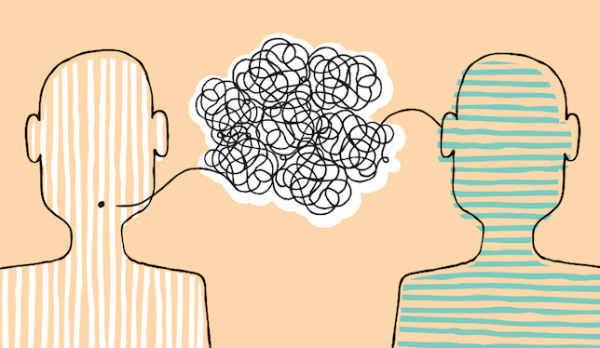8 Keys to Effective Communication

We are social by nature. Relating to others gives us emotional benefits, such as understanding, support and improved self-esteem. Despite this, many people cannot connect with those around them. This can be due to multiple causes, among them not taking the steps to have effective communication.
The people who, on the contrary, do not have problems with establishing an effective communication are those who know how to develop their social intelligence. Some authors, like the American psychologist Daniel Goleman, talk about the importance of this type of capacity in their research. This is the ability to maintain harmonious and peaceful relationships with others without giving up assertiveness.
Skills, such as empathy and understanding, are fundamental when creating a social connection. However, getting the other person to feel confident, secure and understood with us is often not an easy task.
Therefore, there are a number of tools to help improve this type of emotional intelligence. They are steps to achieve an effective communication that can be learned and implemented if we put in the effort. In any case, we can understand a little better the world of social relations by reading about it and applying it.
Keys to effective communication
In any type of interaction, we must take non-verbal communication into account. There is hardly any emphasis on non-verbal communication when we learn, even though in many cases it is more important than the content of the message itself. Gestures, looks and body position are largely responsible for creating an image of us for the person we are speaking with.

In the communication process, synchronicity also plays a starring role. Daniel Goleman states that this ability allows you to read each and every nonverbal cue, from smiling to nodding at the right time. People who can’t get into synchronicity are those whose behavior creates a sense of discomfort and strangeness in others. This behavior is called “dyssemic”, and it is characterized by not understanding the signals that end or change a conversation.
These social deficits are not neurological, rather a failure in learning. Currently, there are a series of programs for teaching synchronicity to both children and adults. For people who have this kind of problem, achieving communication that is effective can be fairly easy. We can improve our social skills and convey the message that really interests us by following a set of guidelines.
1. Paraphrase and ask
Asking and paraphrasing are very important elements in effective communication. Contrary to how it may seem, doing this doesn’t show reluctance, rather interest. The other person feels listened to, which creates a climate of empathy and very beneficial understanding.
Paraphrasing, in turn, allows us clear up parts of the conversation that we do not understand well while we show that we are listening to what is being said to us. Of course, this is a resource like any other, we have to use it at the right moments; if we use it in the wrong moments, it can block communication: the other person might think we’re mocking them.
2. Give compliments
Flattery reinforces what the other person says. It is very useful to use phrases showing approval such as “I think what you say is great”, “I agree with you” or “I love being with you”. You can also use less direct phrases, such as “Fantastic!” Or “Good.”
3. Show empathy
Empathy is a quality that not everyone has. Being able to put oneself in the other’s place improves communication fluency remarkably. It establishes a positive rapport, an emotional sympathy that creates a climate of understanding and trust.
In addition, it generates an image that we can be close and attentive. It creates coordination between the speakers that allows an effective communication between them.

4. Adapt to the context
A good communicative style can be spoiled if we do not take the context into account. The environment, the number of people around or the topic we are going to discuss are very significant. We should avoid arguing with or reprimanding the person we are speaking with in front of others. Being in front of others is a better time to praise them for their achievements.
The noise, the place and the moment should be as appropriate as possible. If we see that our conversation may be hindered by it, it’s better to postpone it for a better time.
5. Respect the other’s opinion
Respecting the opinion of others is fundamental. Insulting, discrediting and underestimating the beliefs of another person shows a great lack of maturity. Throughout our lives we will meet many people who think very differently from us; We will be able to discuss things with them, debate, but in many cases also accept that there may be several points of view about any matter.
After listening to their ideas and arguments, we may continue thinking the same thing, but it is also probable that we question some of our prejudices. Having an open mind does not only benefit our interpersonal communication, but also our own knowledge.
6. Look the other person in the eyes
We recommend establishing eye contact with the other person. It must be done naturally, since the gaze is a highly expressive element. It will make the person we speak with feel heard, which will improve the connection between us.
The opposite situation occurs when we cannot maintain our gaze, because it adds insecurity to the interaction. Looking the other way while speaking expresses a lack of interest in the other person; looking down suggests that we may be lying.
“Effective communication is 20% what you know and 80% how you feel about what you know.”.
-Jim Rohn-
7. Don’t invade personal space
In an attempt to strengthen ties with the other person or to reinforce our position, we may unintentionally invade each other’s personal space. Getting too close, contrary to what we sometimes think, rarely brings closeness. Many people feel uncomfortable and want to move away.
We should adapt the distance we maintain based on two things: the degree of trust we have with the other person and the nature of the subject. It should not be too far or too close, since we are not trying to show suspicion or distrust, right?

8. Respect each other’s turns to speak
Not respecting each other’s turns, besides being very impolite, interrupts the effective communication between both parties. It is necessary to wait until the other has finished speaking in order to speak ourselves. In oral communication, all those involved must respect each other’s turns to speak.
The steps to achieve effective communication are, in general, quite simple. At first they may feel somewhat forced, but by practicing them we will begin to notice the effects. Communicating is an natural process and improving related skills will help us face the world with courage.
Bibliographic references
Goleman, Daniel. (2010). Social Intelligence: The New Science of Human Relationships. Kairós.
Cover image: Norman Rockwell
We are social by nature. Relating to others gives us emotional benefits, such as understanding, support and improved self-esteem. Despite this, many people cannot connect with those around them. This can be due to multiple causes, among them not taking the steps to have effective communication.
The people who, on the contrary, do not have problems with establishing an effective communication are those who know how to develop their social intelligence. Some authors, like the American psychologist Daniel Goleman, talk about the importance of this type of capacity in their research. This is the ability to maintain harmonious and peaceful relationships with others without giving up assertiveness.
Skills, such as empathy and understanding, are fundamental when creating a social connection. However, getting the other person to feel confident, secure and understood with us is often not an easy task.
Therefore, there are a number of tools to help improve this type of emotional intelligence. They are steps to achieve an effective communication that can be learned and implemented if we put in the effort. In any case, we can understand a little better the world of social relations by reading about it and applying it.
Keys to effective communication
In any type of interaction, we must take non-verbal communication into account. There is hardly any emphasis on non-verbal communication when we learn, even though in many cases it is more important than the content of the message itself. Gestures, looks and body position are largely responsible for creating an image of us for the person we are speaking with.

In the communication process, synchronicity also plays a starring role. Daniel Goleman states that this ability allows you to read each and every nonverbal cue, from smiling to nodding at the right time. People who can’t get into synchronicity are those whose behavior creates a sense of discomfort and strangeness in others. This behavior is called “dyssemic”, and it is characterized by not understanding the signals that end or change a conversation.
These social deficits are not neurological, rather a failure in learning. Currently, there are a series of programs for teaching synchronicity to both children and adults. For people who have this kind of problem, achieving communication that is effective can be fairly easy. We can improve our social skills and convey the message that really interests us by following a set of guidelines.
1. Paraphrase and ask
Asking and paraphrasing are very important elements in effective communication. Contrary to how it may seem, doing this doesn’t show reluctance, rather interest. The other person feels listened to, which creates a climate of empathy and very beneficial understanding.
Paraphrasing, in turn, allows us clear up parts of the conversation that we do not understand well while we show that we are listening to what is being said to us. Of course, this is a resource like any other, we have to use it at the right moments; if we use it in the wrong moments, it can block communication: the other person might think we’re mocking them.
2. Give compliments
Flattery reinforces what the other person says. It is very useful to use phrases showing approval such as “I think what you say is great”, “I agree with you” or “I love being with you”. You can also use less direct phrases, such as “Fantastic!” Or “Good.”
3. Show empathy
Empathy is a quality that not everyone has. Being able to put oneself in the other’s place improves communication fluency remarkably. It establishes a positive rapport, an emotional sympathy that creates a climate of understanding and trust.
In addition, it generates an image that we can be close and attentive. It creates coordination between the speakers that allows an effective communication between them.

4. Adapt to the context
A good communicative style can be spoiled if we do not take the context into account. The environment, the number of people around or the topic we are going to discuss are very significant. We should avoid arguing with or reprimanding the person we are speaking with in front of others. Being in front of others is a better time to praise them for their achievements.
The noise, the place and the moment should be as appropriate as possible. If we see that our conversation may be hindered by it, it’s better to postpone it for a better time.
5. Respect the other’s opinion
Respecting the opinion of others is fundamental. Insulting, discrediting and underestimating the beliefs of another person shows a great lack of maturity. Throughout our lives we will meet many people who think very differently from us; We will be able to discuss things with them, debate, but in many cases also accept that there may be several points of view about any matter.
After listening to their ideas and arguments, we may continue thinking the same thing, but it is also probable that we question some of our prejudices. Having an open mind does not only benefit our interpersonal communication, but also our own knowledge.
6. Look the other person in the eyes
We recommend establishing eye contact with the other person. It must be done naturally, since the gaze is a highly expressive element. It will make the person we speak with feel heard, which will improve the connection between us.
The opposite situation occurs when we cannot maintain our gaze, because it adds insecurity to the interaction. Looking the other way while speaking expresses a lack of interest in the other person; looking down suggests that we may be lying.
“Effective communication is 20% what you know and 80% how you feel about what you know.”.
-Jim Rohn-
7. Don’t invade personal space
In an attempt to strengthen ties with the other person or to reinforce our position, we may unintentionally invade each other’s personal space. Getting too close, contrary to what we sometimes think, rarely brings closeness. Many people feel uncomfortable and want to move away.
We should adapt the distance we maintain based on two things: the degree of trust we have with the other person and the nature of the subject. It should not be too far or too close, since we are not trying to show suspicion or distrust, right?

8. Respect each other’s turns to speak
Not respecting each other’s turns, besides being very impolite, interrupts the effective communication between both parties. It is necessary to wait until the other has finished speaking in order to speak ourselves. In oral communication, all those involved must respect each other’s turns to speak.
The steps to achieve effective communication are, in general, quite simple. At first they may feel somewhat forced, but by practicing them we will begin to notice the effects. Communicating is an natural process and improving related skills will help us face the world with courage.
Bibliographic references
Goleman, Daniel. (2010). Social Intelligence: The New Science of Human Relationships. Kairós.
Cover image: Norman Rockwell
This text is provided for informational purposes only and does not replace consultation with a professional. If in doubt, consult your specialist.







